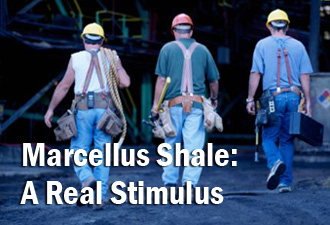Commentary

The Marcellus Shale: A Real Stimulus
A short-sighted proposal to garner more state revenue through a severance tax on natural gas would negatively impact the industry’s development and stunt Pennsylvania’s economic recovery. Advocates for the tax have incorrectly claimed that there is an environmental need for a natural gas tax, and that such a tax would make Pennsylvania comparable with other states.
A tax on natural gas is not warranted to protect the environment or cover social costs. In fact, those proposals have little to do with the environmental or local communities, as the Governor’s proposal would direct 90% of the revenue to the General Fund to cover Harrisburg’s profligacy. The tax would do little for the environment while significantly hindering one of the Commonwealth’s few growth industries.
Drilling companies are already held financially responsible for environmental damages they cause. The Department of Environmental Protection (DEP) is primarily responsible for issuing permits, monitoring well sites, responding to complaints, and fining violators. DEP inspectors routinely and randomly inspect drilling sites. Since 2005, 1,526 Marcellus Shale wells have been drilled in the state. In 2009 alone, the Department carried out 14,544 drilling site inspections, with over 190 employees working full-time on oil and gas oversight.
There will be accidents associated with drilling, and companies should be held responsible for their liability. However, the system of using license fees to fund DEP enforcement and fining firms for violations is working. This year, DEP inspector’s discovered and rectified 421 violations, holding these companies accountable.
Recently, a well owned by EOG Resources had a gas leak (there was no explosion and no employees were injured) and fracturing fluid was spilled. According to DEP Secretary John Hanger, the situation was addressed without fracturing fluid entering water sources, and the company will pay for the area cleanup and inspection costs.
Contrary to tax-increase proponents, the state’s water supplies are not threatened by the hydraulic fracturing process. Over one million wells using hydraulic fracturing have been drilled nationally since the technology was developed in the 1960s, and not a single instance of direct groundwater contamination has been tied to the process. This evidence is supported by DEP’s director of Bureau of Oil and Gas Management, who said, “There has never been any evidence of fracking ever causing direct contamination of fresh groundwater in Pennsylvania or anywhere else.” The chemicals used in the fracturing process are not a mystery, as commonly claimed by natural gas adversaries. State law requires companies to disclose all chemical compounds used in the fracking process, and this information is online.
Additionally, in order to protect local roads, drilling companies are required by state law to post bonds for any roads with municipal weight limits. The drilling company pays for road conditions to be inspected before and after drilling occurs and is responsible for fixing road damages caused by the company. This ensures that no additional tax dollars are needed for necessary road repairs due to increased economic activity.
Further, severance taxes proposed by Harrisburg do not resemble the severance taxes in other states with similar shale formations. These states often offer tax exemptions, credits, or delay the implementation of the tax in hard-to-drill areas to encourage drilling. For example, Texas and Arkansas reduced their severance taxes for high-cost gas wells by nearly 80%. Louisiana suspends its severance tax on horizontally drilled wells for two years.
Most other states rely on a natural gas tax to lower other business taxes. In contrast, Pennsylvania already imposes one of the highest burdens (when combined with federal taxes) on gas companies with the highest corporate income tax rate in the world.
The cost to drill in Pennsylvania is already more expensive than in other states due to topography, labor costs, and regulations. The natural gas market is very competitive, and gas producers cannot simply pass the cost of the tax onto consumers, which is why a natural gas tax will reduce investment in the Commonwealth. A Penn State University study estimated Gov. Rendell’s proposed tax would reduce in-state drilling activity by at least 30 percent.
Politics and the desire for more revenue are the driving force behind calls for a new severance tax, not environmental and social concerns. Any severance tax should be dedicated to environmental and local community impacts; however, there is no indication a tax is needed for this purpose at this time. The tax would hamper an industry that is generating new jobs in a recession.
# # #
Katrina Currie is a Research Associate for the Commonwealth Foundation (www.CommonwealthFoundation.org), a public policy education and research institute located in Harrisburg.